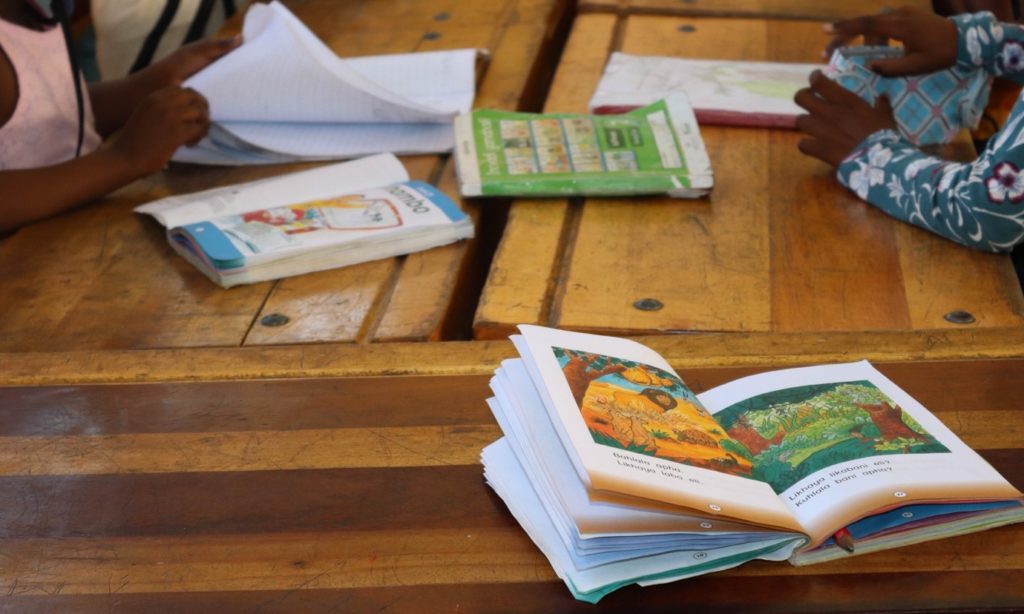By JESSICA FELDTMAN
In the busy township of kwaNobuhle, Kariega (formerly Uitenhage), Volkswagen (VW) has collaborated with educational NGOs and the Department of Education to help learners in five schools read for meaning by Grade 3.
The VW Legacy Literacy Project is grounded in the philosophy of additive bilingualism, which proposes that children would learn another language more easily if they were literate in their mother tongue.
The kwaNobuhle schools enrolled for the literacy project are Vubani Primary, Ntlemeza Primary, Mngcunube Primary, Noninzi Primary, and James Ntungwana Primary.
Nikki Green, the community programmes coordinator for CSD, said the environments around these schools are challenging. “It is not easy circumstances these children come from,” Green said.
“Literacy is the baseline learners need to effect change to the cycle of poverty. This project is about breaking this cycle through literacy development and the provision of opportunities.”
VW installed a Literacy Centre at each school and employed 23 literacy ambassadors, trained by Funda Wande and CSD, that support the foundation phase teachers in their classrooms.
“Although they (literacy ambassadors) are not trained teachers, the level of training they receive from the workshops gives them the needed skills to help the teachers and children successfully,” explained Rambele.
The project aligns with the national curriculum but has introduced more literacy activities to show the vital role literacy in a mother tongue plays in national education.
The project has also driven to show the benefit of Group Guided Reading (GGR) sessions in the classroom. These sessions allow learners to have more time to improve their proficiency in isiXhosa literacy and serve as a way for teachers and literacy ambassadors to identify learners’ learning problems.
These learners are then allowed to receive individual attention from a literacy ambassador, something which teachers cannot achieve in a classroom environment by themselves.
Siyabonga Robert Betsha, a literacy ambassador at Vuba Primary, said learners must be reached in the early stages of their lives if they are to speak, write and read well in any language.
The numerous foundation phase teachers have nothing but praise for how this project has helped them.
“This project has helped teach us as teachers the importance of language development, phonics and reading and story writing,” said Monica Jobo, a Grade 1 teacher at Ntlemeza Primary.
“We have been able to see learners grow in their comprehension and formulation of sentences.”
Grade 2 teacher at Nonizi Primary, Nqatyelwa Konza, said she had observed how her learners had become more confident because they understood their work better.
All the teachers also expressed much gratitude for the presence of the literacy ambassadors.
“The one thing I’ve enjoyed the most has been to work with the ambassador,” said Ntombizanele January, a Grade 2 teacher at Mngcunube Primary. “We are working well together, and I see a lot of difference in the students because of her.”
“Having the literacy ambassador in my classroom has been such a big help because while I do the GGR sessions with some of the learners, he makes sure that the other learners do their work and helps them if they need it,” said Nombulelo Zokufa, a Grade 2 teacher at James Primary.
Rambele explained how illiteracy is a problem closely linked to school dropouts. “When you cannot read and write, you lack confidence. We have seen this in our children, and you often find so many children eventually not wanting to go to school because these children feel like they don’t belong in school,” stated Rambele.
“This programme helps children who feel this way, and the Literacy Centres are a safe space for struggling learners as it gives them the one-on-one attention and help they need.”
The principals of the five schools had much to say about the positive change the VW project brought to the schools.
“The VW programme and all the organizations involved have been a gift to this school,” said Shumikazi Gayika, the principal of Vuba.
“This project is doing wonderful things to our school,” echoed Andile Fuani, Ntlemeza Primary School. “It has made our learners brighter and teachers bolder.”
Victor Jonas, principal of James Ntungwana Primary, said: “This project is a beneficial long-term investment for these children. If this project could be on a national level, it will make a huge impact on our youth.”
While COVID-19 caused a considerable loss of teaching time and jobs, the VW Legacy Literacy Project has provided teachers with some relief and employment to the literacy ambassadors. Green noted how this project could prove how beneficial it would be for teachers and children to have literacy ambassadors’ assistance in South African classrooms permanently.
“This project has great potential – potential for what it can achieve now in the immediate effect of literacy development for the learners, potential for the support for teachers and the learning opportunities for the literacy ambassadors,” Green stated.
“It could develop and promote policy changes which will ultimately benefit South African education and pave the way for greater success for our youth.”


